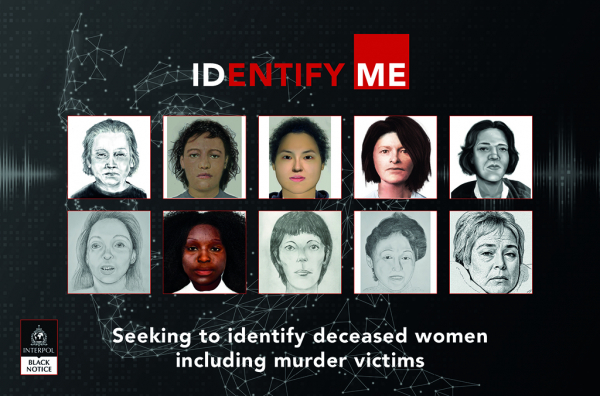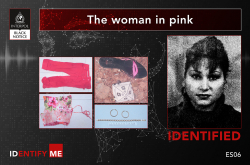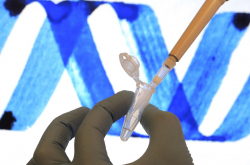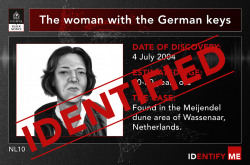LYON, France – Six European countries and INTERPOL have joined forces to solve 46 cold cases involving unidentified women whose remains were found across Europe years ago.
Most of the women were either murdered or had died in suspicious or unexplained circumstances. Some of the cases date from decades ago.
The initiative builds on the success of the Identify Me appeal launched in May 2023 to identify 22 deceased women, with some 1,800 tips received from the public. It has now been expanded to include additional cold cases from Belgium, Germany, and the Netherlands, as well as cases from new participating countries France, Italy, and Spain.

The appeal highlights the importance of public involvement and international cooperation in solving cold cases. It provides hope that crucial leads can be generated, so more of these women can be identified and that justice is served if murder has been established.
Identify Me has already seen noteworthy results after a case was solved after 31 years. Within two days of the launch of the first phase of Identify Me on 10 May 2023, relatives of Rita Roberts in the United Kingdom contacted the appeal hotline after they recognized their relative’s tattoo from news coverage.
Rita Roberts was 31 when she left Cardiff, Wales in February 1992. Her family last heard from her in May 1992, and her unidentified body was discovered in Antwerp on 3 June 1992. An investigation determined that she was a victim of murder. That case remains part of the international effort to request information, identify and seek justice for these deceased women.
Celebrity ambassadors
The appeal features the strong support – including in the video below – of the following leading actresses, singers, and sports figures from the participating countries, to help raise awareness of the cold cases and encourage public involvement:
Belgium: Veerle Baetens and Axelle Red
France: Marie-José Pérec and Sarah Biasini
Germany: Regina Halmich and Katrin Müller-Hohenstein
Italy: Carolina Kostner and Alice Bellandi
Netherlands: Carice van Houten and Stien den Hollander
Spain: Luisa Martin and Mabel Lozano
The cold cases
Details on each case have been made available on INTERPOL’s Identify Me web page, depicting facial reconstructions of some of the women.
There are also images of items such as jewellery and clothing which were discovered at the various land and water sites where the women’s remains were abandoned.
These cases underscore the difficulties in identifying human remains, often found years ago in remote or isolated locations, as well as the challenge of tracing some of these deceased women back to their home countries.
INTERPOL Secretary General Jürgen Stock said:
“Our goal in the Identify Me campaign is simple. We want to identify the deceased women, bring answers to families, and deliver justice to the victims. But we can’t do it alone. That is why we are appealing to the public to join us in this effort. Their help could make the difference.
“Even the smallest piece of information can be vital in helping solve these cold cases. Whether it is a memory, a tip, or a shared story, the smallest detail could help uncover the truth. The public could be the key to unlocking a name, a past, and in delivering long-overdue justice.”
Role of forensics in cold cases
The participating member countries and INTERPOL are working closely together in the appeal to leverage their analytical capabilities and advanced forensic methods, such as DNA profiling, facial reconstruction, and isotopic analysis. These techniques can provide significant clues about the victim's origin, lifestyle, and cause of death.
Since 2021, INTERPOL has been providing investigators with a new global tool, the I-Familia database, which contains some 20,000 profiles from almost 80 countries. It has already solved cases by helping identify unknown bodies through international family DNA kinship matching.
Such cases draw on the voluntary DNA contributions made by relatives of the missing, and underline the role played by the public and partners when it comes to identifying missing persons.
INTERPOL Black Notices
INTERPOL has published a Black Notice alert for each of the unknown women, to seek information on the unidentified bodies and determine the circumstances of their death.
While these alerts are intended for the police only, Identify Me represents the first time INTERPOL has publicly released extracts from Black Notices.
Black Notices can include information on the location where the body was found, biometric information (DNA, fingerprints, facial images), dental charts, physical descriptions of the body or clothing, and any other details relevant to identifying the deceased.
What you can do
Each of these deceased women has a story and relatives who deserve answers. We urge anyone with information to come forward and assist in this vital effort.
Members of the public, particularly those who remember a missing friend or family member, are invited to consult the INTERPOL website and contact the relevant national police team should they have any information. Details can be found on www.interpol.int/IM
For biological relatives who believe one of the women could be their missing loved one, national police can liaise with INTERPOL for international DNA comparison.
Contact forms are at the bottom of each case summary, providing a crucial link for families seeking answers and justice.
Related news

Unknown woman in Spanish cold case named after 20 years
25 September 2025










